(อ่านภาษาไทยด้านล่าง)
Pride Month ♥ As we wrap up June, we continue to carry the spirit of pride forward. With Thailand officially legalizing same-sex marriage, this Pride is more than symbolic, it’s a true celebration of love and equality.
We’re now in the rainy season, but the heat remains intense. Through our new partnership with Climate Resilience for All, we began working with women workers whose work exposes them to extreme heat, discussing how it affects their health and livelihoods. Extreme heat, though increasingly common, is dangerous and poses serious risks. So please take breaks, listen to your body, stay hydrated, and stay mindful of your health and safety.
In June, we’ve been everywhere: joining DMT activities, Thailand-EU FTA seminar, global networking, and discussions on heat. We’re moving forward on all fronts.
We’re already halfway through 2025. A big round of applause to everyone who has been enduring, fighting, and simply making it through. As we move into the rest of the year, let’s keep going and continue supporting each other in all that we do.
Take care, and see you next month!
Our Work This Month
Women Platform Workers Embrace Dance Movement Therapy for Healing and Empowerment
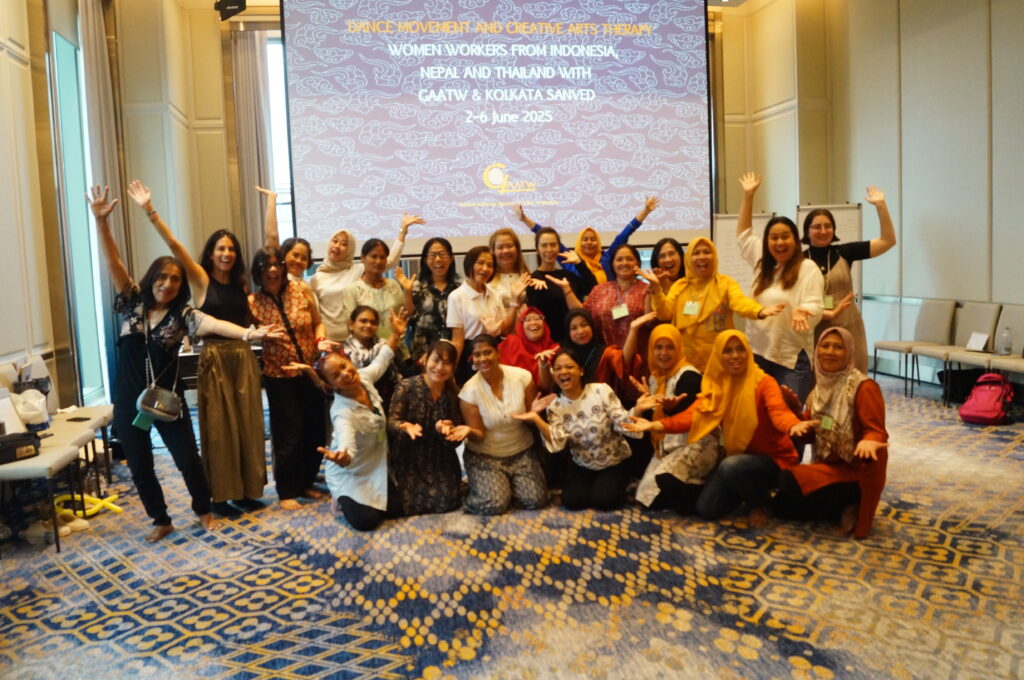
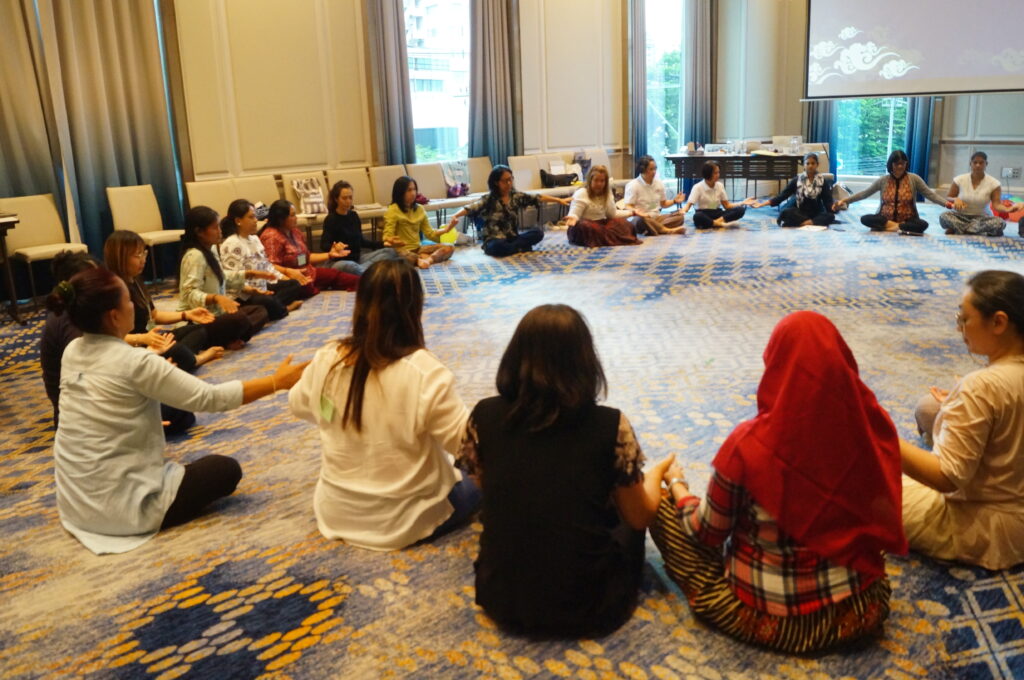
From 2–6 June 2025, JELI and women platform workers from Thailand joined a regional Dance Movement Therapy (DMT) workshop held in Bangkok. The workshop was guided by Kolkata Sanved and organized by the Global Alliance Against Traffic in Women (GAATW).
Participants included women workers from Nepal, Indonesia, Thailand, and the Philippines, representing diverse sectors such as agriculture, domestic work, massage therapy, delivery work, garment and footwear manufacturing, home-based work, and porters in Yogyakarta’s traditional markets. Migrant teachers, singers, and care workers also joined the workshop.
DMT is a feminist therapy instrument in which the women workers collectively create dance movements to heal, empower, reclaim one’s agency and to connect with one another. Building on the energy and insights from the workshop, the women workers are developing plans to conduct DMT sessions with women members in their local communities which will be held in the coming months.
Extream Heat and Effects on Women Workers
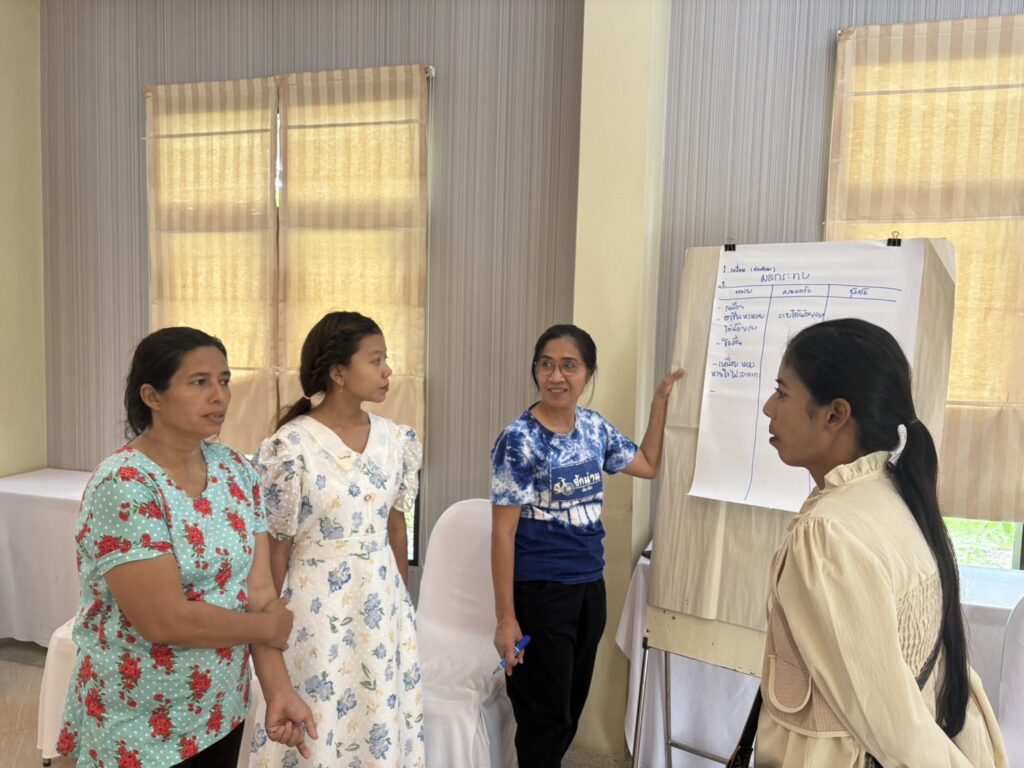
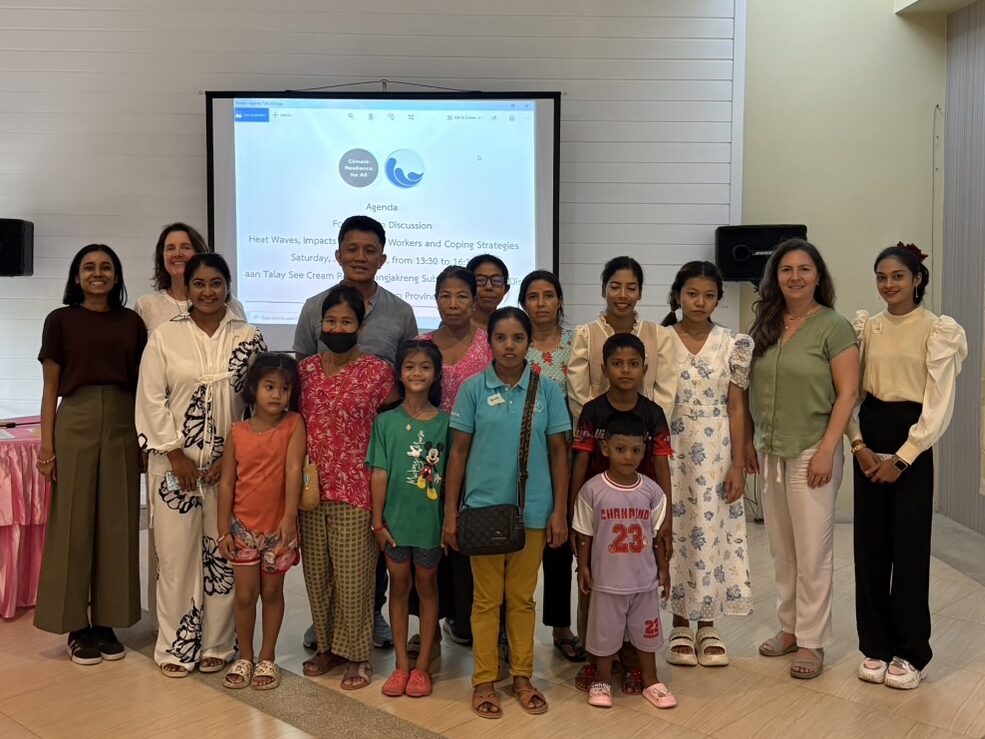
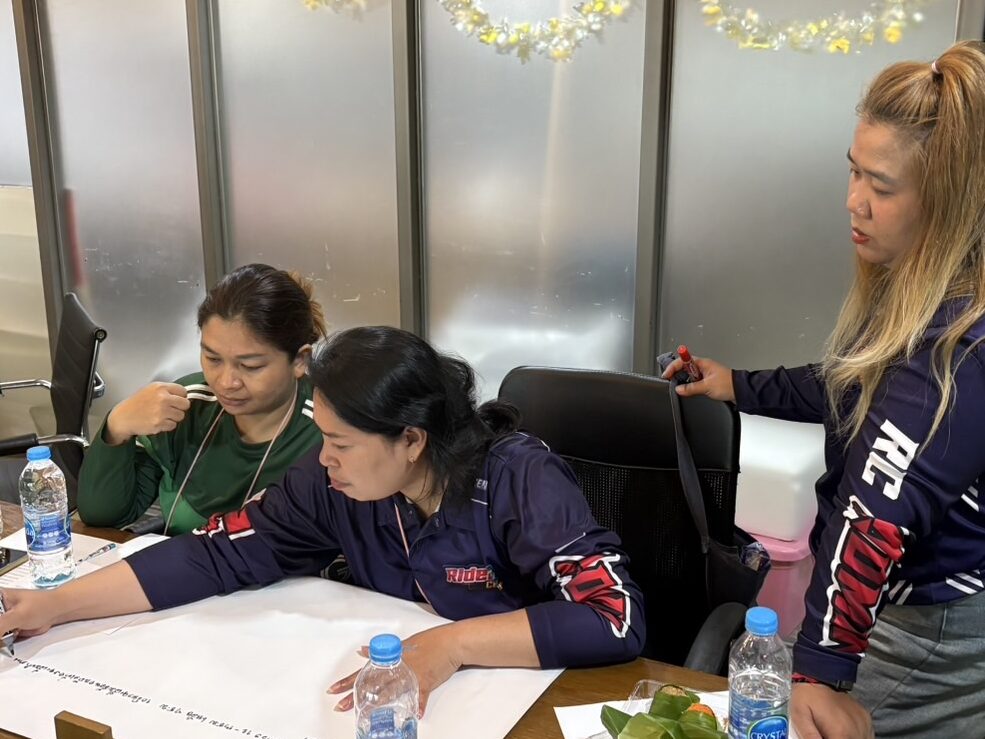
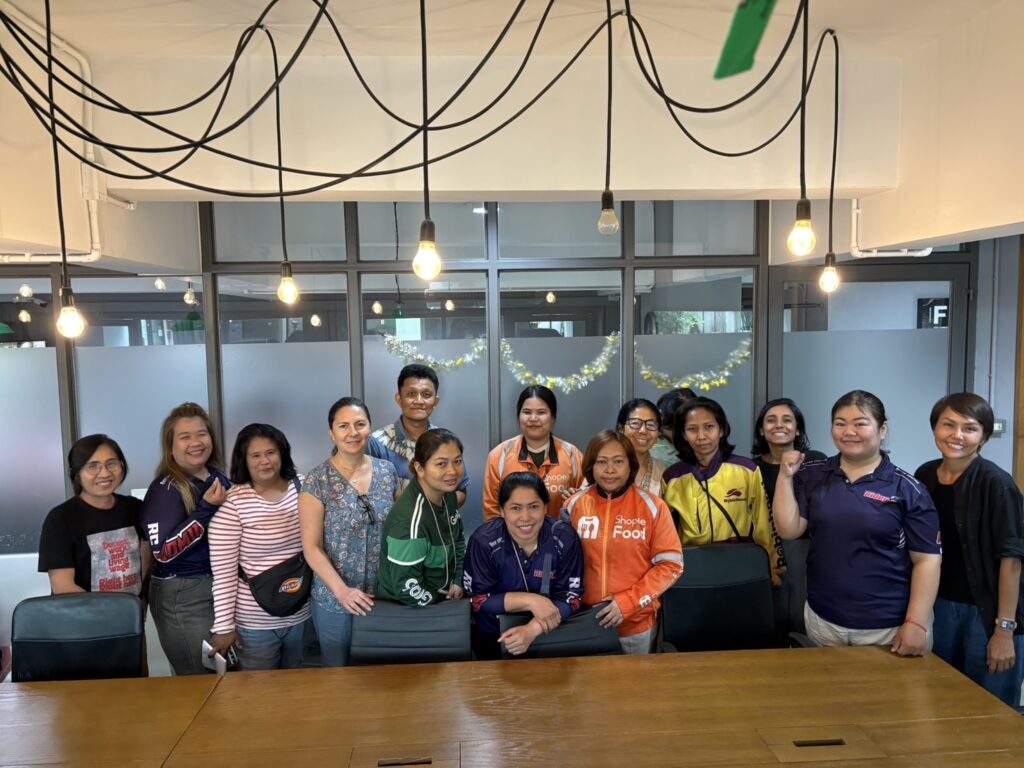
“Thailand is scorching hot,” a common joke, but also a harsh reality. Climate Resilience for All is partnering with JELI to explore how extreme heat affects women workers. Why women? Studies show that women have higher core body temperatures than men, and unpaid care work adds extra burdens to their lives and livelihoods.
From the shared experiences, we learned that agricultural workers, such as shell processing workers, struggle especially during the summer and heatwaves. The heat causes shells to spoil quickly, and when damage occurs, workers have to take responsibility, leading to lost income and job opportunities. To cope, many have shifted their working hours to the night, starting after midnight and resting during the day. However, even daytime rest isn’t truly restful, most of these women still have to cook, take care of children, and handle other housework.
For riders, exposure to sun and heat during the day is unavoidable. If they avoid working in the afternoon, they are forced to work at night, which means fewer orders and higher security risks, especially for women. Their incomes drop, and expenses rise due to heat-related damage to equipment like phones and motorcycles, as well as health costs.
These discussions make it clear that both immediate coping strategies and long-term solutions are needed. Many of the recommendations shared, such as heat warning alerts, support measures like cooling clothing, shaded work areas, and rest spaces for riders, are practical and valuable for shaping policies to better protect workers. It is essential that workers receive support not only from policy frameworks but also directly from employers. At the same time, these conversations remind us of the importance of addressing broader environmental issues as part of the solution.
These focus group discussions will continue with different worker groups to deepen our understanding of the impacts across sectors.
Love in Action: Building Solidarity Beyond Borders
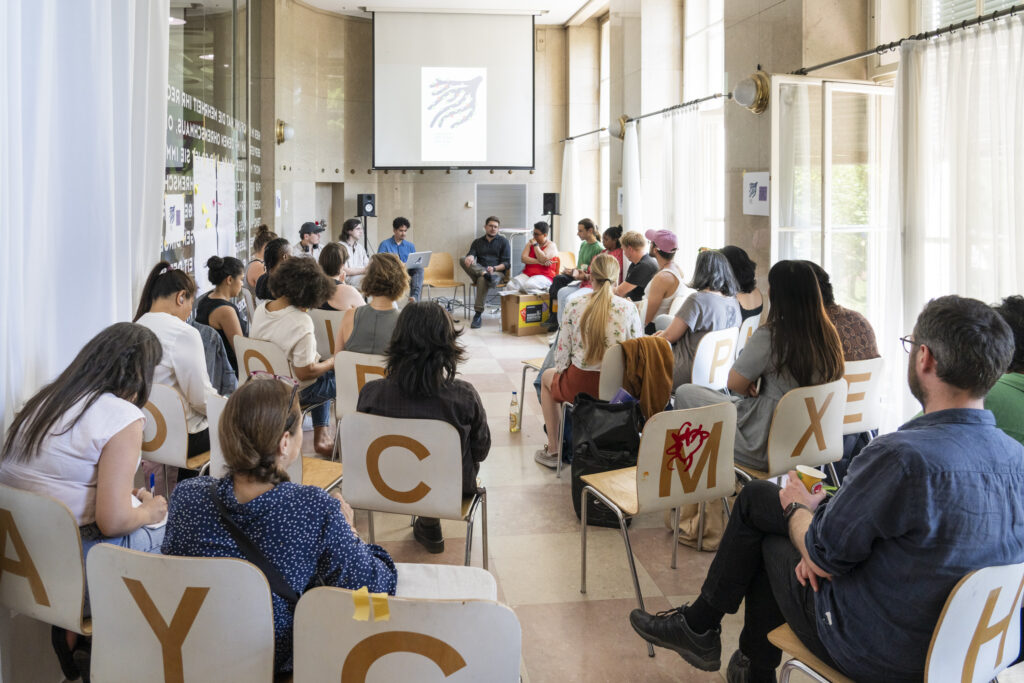
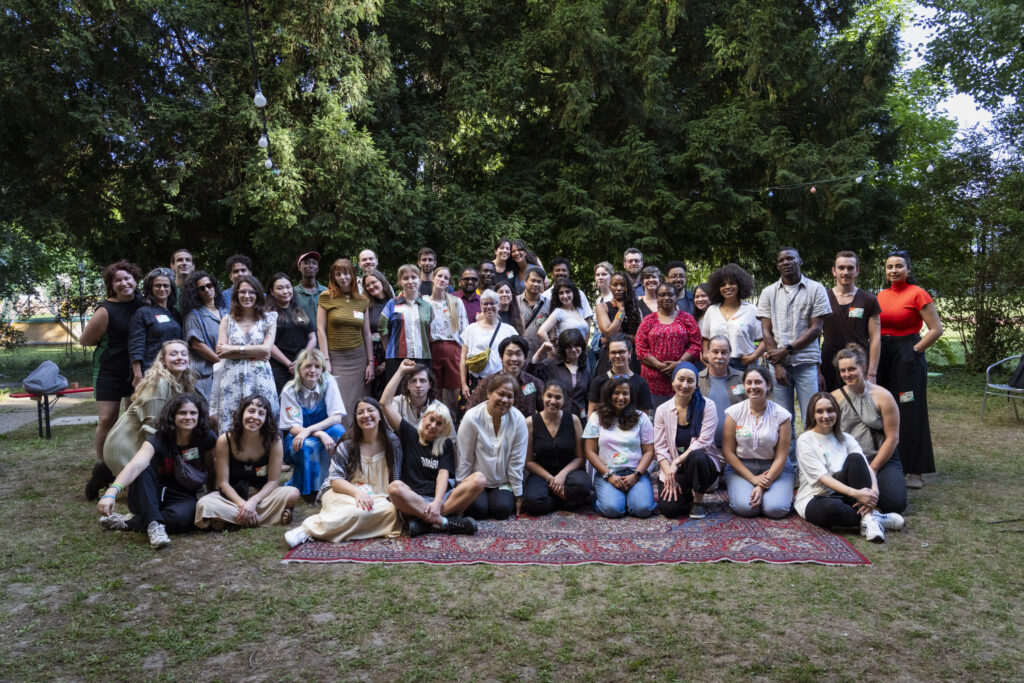
“Love is an action, never simply a feeling.” – Bell Hooks.
From June 11–15, 2025, community organizers, artists, researchers, and activists from around the world gathered in Vienna, Austria, for the Transnational Summer School under the theme “Love in Action – Building Solidarity Beyond Borders” The event, hosted by the School of Transnational Organizing, brought together frontline actors working across areas such as migration, anti-racism, labor justice, climate action, and more, to explore how love, understood as a transformative act, can fuel solidarity and collective change.
For the second year in a row, JELI participated as one of the few Southeast Asian organizations in the gathering. Over five days, participants engaged in intensive workshops, strategy exchanges, public forums, and creative spaces designed to build lasting transnational alliances. Workshops spanned diverse topics, from organizing strategies among migrant and undocumented workers, resistance in Eastern Europe, and feminist embodied practices, to book launches and open artivist spaces.
The Summer School wrapped up with a People’s Assembly, inviting Vienna residents to join an open forum for discussion and collective imagining. Together, participants explored how to build long-term strategies and form new, unexpected alliances that can cross borders and sectors.
In a world facing deepening inequalities and rising authoritarianism, this year’s Summer School is a strong reminder that solidarity is not limited by geography. When love is practiced as action, care, and shared responsibility, it becomes a powerful tool for creating change.
Voices of the People to the Negotiating Table: Who Wins and Who Loses from the Thailand-EU FTA?
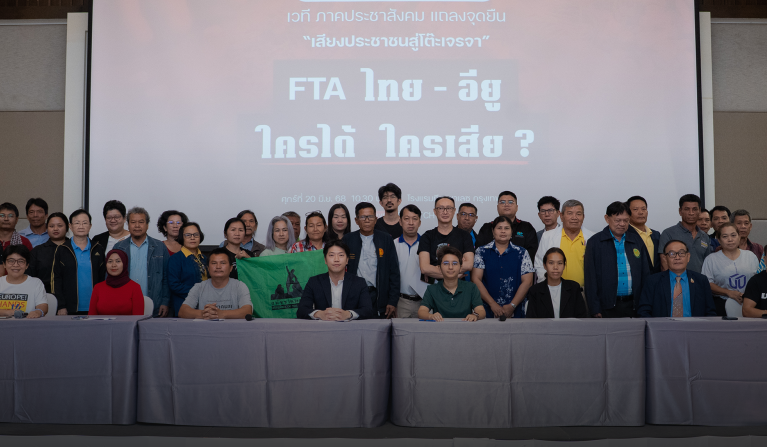
On June 19, JELI, among the civil society organizations working on labor rights, attended the seminar “Voices of the People to the Negotiating Table: Who Wins and Who Loses from the Thailand-EU FTA?” held at TK. Palace & Convention Hotel, Bangkok, organized by FTA Watch, Thai Network of People Living with HIV/AIDS ( TNP+), Thailand Consumers Council, and the BioThai Foundation.
The seminar brought together diverse stakeholders from across the country, including the National Farmers Council, the Assembly of the Poor, and other allied networks, to better understand the Thailand–EU Free Trade Agreement (FTA), which is set to enter its sixth round of negotiations at the end of June.
Given that the Thai government has yet to publicly disclose the details of its negotiating proposals, participants raised concerns about the potential negative human rights implications of the commitments following the FTA signing. Several recommendations were made to the Thai negotiating team, represented by the Ministry of Commerce, including calls for the government to prioritize the public interest over large corporate interests and to make Thailand’s FTA negotiation proposals publicly available. The aim is to enable meaningful public participation in monitoring and decision-making processes through a more systematic and transparent approach.
The event concluded with a joint statement endorsed by 18 civil society organizations. Among other demands, it called on the Thai government to ratify the International Labour Organization’s fundamental Conventions No. 87 and 98 on freedom of association and collective bargaining, a long-standing demand of Thai labor networks.
Watch the press conference here, and read the full joint statement (in Thai) here.
Important News
After years of advocacy, the International Labour Organization (ILO) will begin drafting the first-ever international standards to protect the rights of app-based and platform workers, from ride-hail drivers to food delivery couriers. Read more: Human Rights Watch
Thai cabinet reshuffle settled as PM Paetongtarn Shinawatra submits new list for royal endorsement, following the Bhumjaithai Party’s withdrawal, with Deputy PM and Defence Minister Phumtham Wechayachai expected to take over as Interior Minister. Read more: Bangkok Post
Border tensions spark uncertainty as Cambodian migrant workers in Thailand urged to return home amid threats of closures, import bans, and rising diplomatic strain. Read more: Bangkok Post
Thailand moves to recriminalize cannabis, banning the sale of cannabis for recreational use and required a doctor’s prescription for any purchase. The new rules will take effect once published in the Royal Gazette, expected within days. Read more: Reuters
Story of Impact
“I graduated with a degree in Industrial Education in Civil Engineering from Rajamangala University of Technology Phra Nakhon. I have SLE, an autoimmune disease that made my hair fall out and caused wounds all over my body. During the COVID-19 outbreak, I was under so much stress. Under the lockdown, it was very difficult to find a job. So, I started working as a delivery rider as it was one of the only options I had left, something I could still do to survive.
At first, the income was quite good. I didn’t really understand the job assignment system or the platform’s rules. The pay-per-delivery rate was acceptable, and there were special bonuses. If I completed 20 deliveries in a day, I’d get an extra 200 baht. During lunch rush, if I managed five jobs, that was another 200. They also gave me two free uniform shirts, and after completing 10 jobs, I got a free food delivery box. I usually started around 10 a.m. and finished before 8 p.m., earning around 300-500 baht per day.
In the beginning, I thought I was getting fewer orders because of my phone or my internet connection, so I saved up to buy a new phone. Later, I learned from other riders that the platform deliberately limited orders for older riders to make room for new ones. I only realized this after I had already purchased the new phone. In this job, even a few seconds matter when accepting orders, and older riders tend to get fewer jobs. Even so, I actually enjoyed riding. I loved being on the road and seeing new places. I worked as a rider from 2020 until the accident that changed my life forever in 2021.
On June 4, 2021, around 4 p.m., I was delivering a food order to a customer and riding behind a six-wheel truck. When the truck turned left into a gas station without signaling, I crashed into it.
I was fully conscious after the collision. At first, I felt numb and didn’t realize I would lose my leg. I was taken to Ayutthaya Hospital, and the doctors concluded they needed to amputate my right leg above the knee because the bones were shattered and the tissue was severely damaged. It was necessary to save my life. I was devastated, but I thought to myself, at least I survived.
After the accident, the people who truly helped me were other riders in Ayutthaya province. They came together to raise donations and support me when I needed it most. Meanwhile, the platform company, the one I was working for when the accident happened, sent a representative to the hospital once. They gave me 15,000 baht as a consolation payment, since I had to explain why the food didn’t reach the customer, and that was it. I never heard from them again. On top of that, there were legal problems, the company that owned the truck tried to threaten me into taking the blame.
My daily life completely changed. I spent 3-4 months in the hospital. I needed multiple surgeries to clean and reshape the wound. After that, I had to take care of my wound at home. My mother has been my main caregiver since the beginning. Most of the treatment was covered by the 30-baht health scheme, but I still had to pay for many expenses myself. In the beginning, I couldn’t support myself, even standing up was difficult. It took a long time to regain some independence.
The hardest part after the accident was losing my income. Our family income didn’t just drop, it completely disappeared. Now, I only receive 800 baht a month as a disability allowance. After paying 300 baht into social security, I’m left with just 500 baht a month.
Since then, I have started advocating for riders’ rights and protections. Riders work for these platforms, generating huge profits for them, but they don’t provide any protection for us. Nowadays our income has decreased significantly. We have to bear many costs ourselves: fuel, internet, vehicle maintenance. What they give us isn’t enough. Some riders die on the job. They don’t even have money for a funeral and the platforms provide no assistance at all.
I don’t want anyone else to go through what I did. If we had access to the Compensation Fund and legal labor rights, it would benefit those still working in this field. I want to push for better systems so others don’t have to go through what I did without any support.
Today, being disabled makes it even harder to find work. Recently, I joined a vegetable gardening project supported by Osotspa Foundation and the Social Development and Human Security Office. I just received the equipment last Thursday. The project helps disabled people generate income by providing tools, soil, fertilizer, seeds so we can start growing right away.
In the future, I will keep doing my best in both work and advocacy, continuing to be a voice for riders. I want to remind all riders to be extremely careful. Take good care of yourselves. I hope one day riders will have real welfare and real protection.”
Today, Jimmy-Maneewan Maneesrikham is starting over, finding new ways to support herself and her family. At the same time, she remains a strong voice pushing for a compensation fund for riders, a safety net for those working risky jobs who are still excluded from proper social protections.
This story is a reminder that platform companies continue to take no responsibility for the people who work for them, while the government has yet to take serious action to address these gaps. More than that, they are even pushing for laws that would strip riders of their entitled legal rights.
It has been a long fight and it’s far from over. Every voice makes a difference in creating fairer, safer conditions for riders.
Follow and support Jimmy’s journey on her page: wan.wang.khxng.khn.wang.ngan
Pride Month ♥ เมื่อเดือนมกราคมที่ผ่านมา กฎหมายสมรสเท่าเทียมมีผลบังคับใช้ในประเทศไทยอย่างเป็นทางการ ทำให้ Pride Month ปีนี้ไม่ได้เป็นเพียงแค่สัญลักษณ์ แต่เป็นการเฉลิมฉลองทั้งความรักและความเท่าเทียมได้อย่างแท้จริง
เราเริ่มเข้าสู่ฤดูฝนกันอย่างเป็นทางการตั้งแต่เดือนที่แล้วแต่อากาศก็ยังร้อนอยู่มาก สถาบันแรงงานฯ ได้จับมือกับ Climate Resilience for All จัดเการประชุมกลุ่มย่อยเพื่อพูดคุยกับคนงานหญิงที่ต้องทำงานกลางแจ้งและเผชิญกับสภาพอากาศที่ร้อนจัด ถึงผลกระทบที่ความร้อนมีต่อสุขภาพ การทำงาน และความเป็นอยู่โดยรวม ถึงแม้อากาศร้อนจัดจะถูกมองเป็นเรื่องค่อนข้างปกติในไทย แต่จริงๆ แล้วเป็นเรื่องที่อันตรายและส่งผลต่อสุขภาพมาก ดังนั้น หากคุณต้องเผชิญกับอากาศร้อนจัดเป็นประจำและเป็นเวลานาน อย่าลืมหยุดพักบ้าง สังเกตร่างกายตัวเอง ดื่มน้ำเยอะๆ และดูแลสุขภาพให้มากๆ
เดือนมิถุนายนที่ผ่านมานี้ สถาบันแรงงานฯ ได้เดินหน้าทำงานในหลากหลายประเด็น ทั้งร่วมกิจกรรมสตรีนิยม DMT ร่วมกับคนงานแพลตฟอร์มหญิง เข้าร่วมการสัมมนา FTA ไทย-สหภาพยุโรป กิจกรรมเรียนรู้และสร้างเครือข่ายที่เวียนนา รวมถึงการสนทนาเรื่องความร้อนด้วย เรากำลังพยายามเดินหน้าในทุกมิติ
ตอนนี้ครึ่งปี 2025 ก็ผ่านไปแล้ว ยินดีและเป็นกำลังใจให้กับทุกคนที่ยังคงอดทน ต่อสู้ และก้าวต่อไปในแต่ละวัน เข้าสู่ครึ่งปีหลัง ขอให้เรายังคงก้าวต่อไปและคอยสนับสนุนกันและกันในทุกการต่อสู้หลังจากนี้
รักษาสุขภาพ แล้วเจอกันเดือนหน้า!
งานของเรา
เต้น รักษา เยียวยา: พลังการเคลื่อนไหวของแรงงานหญิง


เมื่อวันที่ 2-6 มิถุนายน 2568 JELI และกลุ่มแรงงานแพลตฟอร์มหญิงจากประเทศไทย ได้เข้าร่วมเวิร์กชอปการบำบัดด้วยการเคลื่อนไหวและการเต้น (Dance Movement Therapy: DMT) ระดับภูมิภาค ซึ่งจัดขึ้นที่กรุงเทพฯ เวิร์กชอปนี้นำกิจกรรมโดย Kolkata Sanved และจัดโดยพันธมิตรสากลต้านการค้าหญิง (Global Alliance Against Traffic in Women: GAATW)
ผู้เข้าร่วมประกอบด้วยแรงงานหญิงจากเนปาล อินโดนีเซีย ไทย และฟิลิปปินส์ จากหลากหลายสาขาอาชีพ เช่น ภาคเกษตร งานบ้าน หมอนวด ไรเดอร์ ผลิตเสื้อผ้าและรองเท้า งานทำที่บ้าน และคนหาบของขายในตลาดยอกยาการ์ตา นอกจากนี้ยังมีคนงานข้ามชาติที่ประกอบอาชีพครู นักร้อง และคนทำงานดูแลเข้าร่วมด้วย
DMT เป็นเครื่องมือบำบัดเชิงสตรีนิยม ที่ให้แรงงานหญิงร่วมกันสร้างสรรค์การเคลื่อนไหวและการเต้นเพื่อเยียวยา เสริมพลัง และฟื้นฟูการควบคุมชีวิตของตนเอง ให้คนงานได้เชื่อมโยงซึ่งกันและกัน เพื่อเป็นการต่อยอดจากประสบการณ์ที่ได้รับจากเวิร์กชอปครั้งนี้ แรงงานหญิงได้วางแผนเพื่อจัดกิจกรรม DMT ร่วมกับผู้หญิงในชุมชนท้องถิ่นของตนเอง ซึ่งคาดว่าจะจัดขึ้นในอีกไม่กี่เดือนข้างหน้าว่าของพวกเรา คนทำงานทุกคน พวกเราจะเปลี่ยนแปลงกฎหมายคุ้มครองแรงงาน ให้มีมาตรฐาน เท่าเทียม และเป็นธรรม”
ความร้อนสูงกับคนงานหญิง: ผลกระทบและวิธีการรับมือ




“ประเทศไทยร้อนมาก” เป็นคำพูดที่ฟังดูปกติ แต่ในขณะเดียวกันก็เป็นความจริงที่โหดร้ายสำหรับหลายๆ คน JELI จึงร่วมมือกับ Climate Resilience for All เพื่อสำรวจว่าความร้อนจัดส่งผลกระทบต่อคนงานหญิงอย่างไรบ้าง ส่วนทำไมต้องเป็นผู้หญิงนั้น เนื่องจากงานวิจัยหลายชิ้นชี้ให้เห็นว่าผู้หญิงมีอุณหภูมิร่างกายสูงกว่าผู้ชาย อีกทั้งยังมีงานบ้านและการดูแลครอบครัวที่เพิ่มภาระในชีวิตประจำวัน
เมื่อวันที่ 7 และ 9 มิถุนายน 2568 JELI ได้จัดเวทีพูดคุยกับแรงงานข้ามชาติหญิงในจังหวัดสมุทรสงครามและกับไรเดอร์หญิงในกรุงเทพฯ การพูดคุยทั้งสองครั้งเต็มไปด้วยข้อมูลเชิงลึกและสะท้อนภาพความจริงของสิ่งที่คนงานเหล่านี้ต้องเผชิญในชีวิตประจำวันกับการทำงานในอากาศร้อนจัด รวมถึงวิธีการที่พวกเธอใช้เพื่อปรับตัว
จากการแบ่งปันประสบการณ์ของกลุ่มคนงานหญิงทำให้เราได้เรียนรู้ว่าแรงงานเกษตร เช่น คนงานแกะหอย ต้องเผชิญกับความยากลำบากเป็นพิเศษในช่วงหน้าร้อน เพราะความร้อนทำให้หอยเน่าเสียได้เร็วขึ้น ถ้าแกะไม่ทันและหอยเน่าเสีย รายได้ก็จะลดลงและยังต้องรับผิดชอบความเสียหายทั้งหมดที่เกิดขึ้นด้วย เพื่อเป็นการปรับตัว หลายคนจึงต้องเปลี่ยนเวลาทำงานไปทำตอนกลางคืนหลังเที่ยงคืนและพักผ่อนตอนกลางวันเพื่อหลีกเลี่ยงการทำงานในอากาศร้อน แต่การพักกลางวันก็ไม่ได้พักจริงจัง เพราะผู้หญิงส่วนใหญ่ยังต้องทำกับข้าว ดูแลลูก และงานบ้านอื่นๆ ด้วย
สำหรับไรเดอร์ การหลีกเลี่ยงความร้อนในตอนกลางวันแทบเป็นไปไม่ได้ ถ้าไม่ทำงานช่วงบ่ายพวกเธอจะต้องออกวิ่งงานตอนกลางคืนแทน ซึ่งจำนวนออเดอร์ก็จะน้อยลงและมีความเสี่ยงด้านความปลอดภัยเพิ่มขึ้นอีก รายได้ลดลง ในขณะที่ค่าใช้จ่ายเพิ่มขึ้น เช่น ค่าโทรศัพท์ ค่าซ่อมบำรุงมอเตอร์ไซค์ที่เสียหายเร็วขึ้นจากความร้อน รวมถึงค่ารักษาพยาบาลที่มาจากปัญหาสุขภาพจากอากาศที่ร้อน เช่น ไมเกรน ใจสั่น ความดันสูง เป็นต้น
การพูดคุยครั้งนี้ทำให้เห็นถึงความจำเป็นเร่งด่วนในการวางแนวทางรับมือทั้งเฉพาะหน้าและการแก้ไขระยะยาว คนงานหญิงได้ร่วมกันเสนอข้อเสนอหลายอย่าง เช่น การมีระบบแจ้งเตือนภัยความร้อน การสนับสนุนอุปกรณ์ช่วยคลายร้อน พื้นที่ทำงานที่มีร่มเงา และจุดพักรถสำหรับไรเดอร์ ซึ่งล้วนเป็นข้อเสนอที่เป็นรูปธรรม สามารถใช้ต่อยอดเพื่อกำหนดนโยบายที่ช่วยสนับสนุนและคุ้มครองแรงงานได้ดียิ่งขึ้น สิ่งสำคัญคือการสนับสนุนต้องมาจากทั้งนโยบายระดับโครงสร้างและนายจ้างเช่นกัน ในขณะเดียวกัน ก็เน้นย้ำถึงความสำคัญของประเด็นปัญหาสิ่งแวดล้อมในภาพรวมด้วย
JELI จะยังคงจัดเวทีพูดคุยกลุ่มย่อย (FGD) ร่วมกับกลุ่มแรงงานจากหลากหลายอาชีพต่อไปเพื่อขยายความเข้าใจถึงผลกระทบในแต่ละภาคส่วนให้ชัดเจนยิ่งขึ้นชี้แจงข้อคัดค้านและขอการสนับสนุนให้เกิดการคว่ำร่าง พ.ร.บ. ที่ไม่ได้ส่งเสริมหรือคุ้มครองใครอย่างแท้จริงนี้
“ภราดรภาพข้ามพรมแดน”


“ความรักคือการกระทำ ไม่ใช่แค่ความรู้สึก” – Bell Hooks
เมื่อวันที่ 11-15 มิถุนายน 2568 บรรดานักจัดตั้ง ศิลปิน นักวิจัย และนักเคลื่อนไหวจากทั่วโลกได้มารวมตัวกันที่กรุงเวียนนา ประเทศออสเตรีย ในกิจกรรม Transnational Summer School ภายใต้ธีม “Love in Action – Building Solidarity Beyond Borders” งานนี้จัดขึ้นโดย School of Transnational Organizing โดยมีเป้าหมายในการรวบรวมผู้ที่ทำงานในประเด็นต่างๆ เช่น การย้ายถิ่นฐาน ต่อต้านการเหยียดเชื้อชาติ แรงงาน สภาพภูมิอากาศ และอื่นๆ โดยเชื่อมโยงประเด็นต่างๆ บนที่ตั้งของ “ความรัก” ซึ่งสามารถเป็นพลังขับเคลื่อนความเป็นภราดรภาพ (Solidarity) และการเปลี่ยนแปลงร่วมกันได้
โดย JELI เข้าร่วมงานนี้ติดกันเป็นปีที่สอง และเป็นหนึ่งในไม่กี่องค์กรที่มาจากภูมิภาคเอเชียตะวันออกเฉียงใต้ ตลอดระยะเวลา 5 วัน ผู้เข้าร่วมได้ร่วมกิจกรรมเวิร์กชอป-เวทีสาธารณะ แลกเปลี่ยนกลยุทธ์ เรียนรู้จากประสบการณ์ของผู้อื่น และเข้าร่วมพื้นที่สร้างสรรค์ต่างๆ เพื่อสร้างเครือข่ายพันธมิตรข้ามชาติ เวิร์กชอปครอบคลุมหัวข้อต่างๆ เช่น กลยุทธ์การจัดตั้งแรงงานข้ามชาติและแรงงานที่ไม่มีเอกสาร การเคลื่อนไหวต้านการกดขี่ในยุโรปตะวันออก การปฏิบัติทางกายเชิงสตรีนิยม การเปิดตัวหนังสือ และพื้นที่การเคลื่อนไหวทางศิลปะ
งานในครั้งนี้ ปิดท้ายด้วยการจัด People’s Assembly แบบเปิด ซึ่งเชิญชวนชาวเวียนนาและใครก็ตามที่มีความสนใจมาร่วมแลกเปลี่ยน พูดคุย และร่วมจินตนาการถึงอนาคตไปด้วยกัน ผู้เข้าร่วมได้ร่วมกันถกเถียงถึงแนวทางการสร้างกลยุทธ์ระยะยาว และการสร้างพันธมิตรใหม่ๆ ทั้งข้ามพรมแดนและข้ามประเด็น
ในโลกที่เต็มไปด้วยความเหลื่อมล้ำและกระแสอำนาจนิยมที่เพิ่มขึ้น งานในปีนี้เป็นการย้ำเตือนว่าความเป็นน้ำหนึ่งใจเดียวกันนั้นจะไม่ถูกจำกัดด้วยพรมแดน เมื่อความรักเท่ากับการกระทำ มันถึงจะกลายเป็นเครื่องมือที่ทรงพลังในการสร้างการเปลี่ยนแปลงได้
“เสียงประชาชนสู่โต๊ะเจรจา: FTA ไทย-อียู ใครได้ ใครสีย?”

วันที่ 19 มิถุนายน 2568 JELI เป็นหนึ่งในตัวแทนองค์กรภาคประชาสังคมด้านแรงงานเข้าร่วมงานสัมมนา “เสียงประชาชนสู่โต๊ะเจรจา: FTA ไทย-อียู ใครได้ ใครเสีย?” ณ โรงแรมทีเค พาเลซ แอนด์คอนเวนชั่น กรุงเทพฯ จัดโดยกลุ่มศึกษาข้อตกลงเขตการค้าเสรีภาคประชาชน (FTA Watch) ร่วมกับเครือข่ายผู้ติดเชื้อเอชไอวี/เอดส์ ประเทศไทย สภาองค์กรของผู้บริโภค และมูลนิธิชีววิถี (BioThai) เมื่อวันที่ 19-20 มิถุนายน 2025
ภายในงานมีกลุ่มผู้มีส่วนได้ส่วนเสียจากภาคส่วนต่างๆ ในหลายจังหวัดทั่วประเทศไทย เช่น สภาเกษตรกรแห่งชาติ สมัชชาคนจน และภาคีเครือข่ายต่างๆ เข้าร่วมเรียนรู้และทำความเข้าใจเกี่ยวกับความตกลงการค้าเสรีระหว่างไทยและสหภาพยุโรป ซึ่งจะมีกำหนดการเจรจาการค้าระหว่างกันขึ้นเป็นครั้งที่ 6 ในปลายเดือนมิถุนายน
ด้วยเงื่อนไขในข้อตกลงการค้าฯ ไม่มีการเผยแพร่รายละเอียดด้านข้อเสนอในการเจรจาแต่ละครั้งของฝั่งไทยอย่างเป็นสาธารณะ กลุ่มผู้มีส่วนได้ส่วนเสียภายในงานได้แสดงข้อกังวลถึงผลกระทบเชิงลบในประเด็นสิทธิมนุษยชน จากข้อผูกมัดที่จะมีขึ้นภายหลังการลงนาม FTA และมีข้อเสนอต่อคณะผู้แทนไทยซึ่งนำโดยกระทรวงพาณิชย์ ในการเจรจา FTA อย่างหลากหลาย เช่น การมีข้อเสนอให้รัฐบาลไทยคำนึงถึงผลประโยชน์ของประชาชนมากกว่ากลุ่มนายทุนใหญ่ รวมถึงจัดให้มีการเผยแพร่รายละเอียดข้อเสนอของฝั่งไทยอันเป็นปัจจุบันแก่ภาคประชาชนทราบและมีส่วนร่วมในการติดตามรวมถึงตัดสินใจอย่างเป็นระบบและโปร่งใส ตลอดจนมีแถลงการณ์ร่วมกับ 18 องค์กรจากภาคประชาสังคม เรียกร้องในประเด็นต่างๆ รวมถึงให้รัฐบาลไทยลงนามในสัตยาบันอนุสัญญาหลักขององค์การแรงงานระหว่างประเทศ (ILO) ฉบับที่ 87 และ 98 เป็นต้น
ดูคลิปวิดีโอการแถลงข่าว ที่นี่ อ่านแถลงการณ์รวมฉบับเต็มได้ ที่นี่
ข่าวสำคัญ
หลังจากการรณรงค์ผลักดันมานานหลายปี องค์การแรงงานระหว่างประเทศ (ILO) จะเตรียมร่างมาตรฐานสากลฉบับแรกเพื่อคุ้มครองสิทธิของแรงงานแพลตฟอร์มและแรงงานที่รับงานจากแอปพลิเคชัน ไม่ว่าจะเป็นคนขับรถรับส่งหรือไรเดอร์ส่งอาหาร อ่านที่: Human Rights Watch
ผังคณะรัฐมนตรีใหม่ได้ข้อสรุปแล้ว นายกรัฐมนตรีแพรทองธาร ชินวัตร ได้ยื่นรายชื่อคณะรัฐมนตรีชุดใหม่เพื่อขอพระราชทานโปรดเกล้าฯ แต่งตั้ง โดยมีรายงานว่า นายภูมิธรรม เวชยชัย รองนายกรัฐมนตรีและรัฐมนตรีกลาโหม จะเข้ารับตำแหน่งรัฐมนตรีว่าการกระทรวงมหาดไทย อ่านที่: Bangkok Post
ความตึงเครียดบริเวณชายแดนไทย-กัมพูชา สร้างความไม่แน่นอนให้กับสถานการณ์แรงงานข้ามชาติชาวกัมพูชาในประเทศไทย หลังจากกัมพูชากระตุ้นให้เดินทางกลับประเทศ ท่ามกลางกระแสการขู่ปิดด่าน การแบนการนำเข้า และความตึงเครียดทางการเมืองที่เพิ่มสูงขึ้น อ่านที่: Bangkok Post
ประเทศไทยเดินหน้าประกาศคุมกัญชาเสรี
สั่งห้ามจำหน่ายกัญชาเพื่อการสันทนาการ และกำหนดให้ต้องมีใบสั่งจากแพทย์ในการซื้อทุกครั้ง กฎระเบียบใหม่นี้จะมีผลบังคับใช้ทันทีหลังจากประกาศในราชกิจจานุเบกษาในเร็วๆ นี้ อ่านที่: Reuters
เรื่องเล่ารายเดือน
“เราเรียนจบวิศวกรรมโยธา ครุศาสตร์อุตสาหกรรม ที่ราชมงคลพระนคร เราเป็นโรคพุ่มพวงแพ้ภูมิตัวเอง (SLE) ทำให้ผมร่วงและมีแผลตามร่างกาย ช่วงที่โควิด-19 ระบาด เราเกิดความเครียดสะสม พอเป็นช่วงล็อคดาวน์ การสมัครงานก็ยาก เลยมาขับไรเดอร์ส่งอาหารเพราะเป็นอาชีพที่ทำได้ในช่วงนั้น
ตอนที่ขับในช่วงแรกๆ รายได้ก็ถือว่าดี แต่เราก็ยังไม่รู้ระบบการจ่ายงาน และกฎเกณฑ์ของบริษัทว่าเป็นยังไง เพียงแค่ค่ารอบ
โอเคและมีโบนัสพิเศษ เช่น ถ้าวันไหนรับลูกค้าถึง 20 รายก็จะได้เงินเพิ่ม 200 บาท ช่วงเที่ยงที่เป็นช่วงเร่งด่วน ถ้าวิ่งได้ 5 งานก็จะได้เพิ่มอีก 200 บาท แล้วเราก็ได้เสื้อฟรี 2 ตัว ถ้าทำงานครบ 10 งานก็ได้กล่องใส่อาหารฟรี เราออกวิ่งงานประมาณสิบโมงเช้าทุกวัน กลับบ้านไม่เกินสองทุ่ม วันนึงได้ประมาณ 300-500 บาท
ช่วงแรกๆ เราไม่รู้ คิดว่าเน็ตเราไม่แรงหรือโทรศัพท์มีปัญหา เพราะรับงานได้น้อย เลยไปหาซื้อโทรศัพท์ใหม่ มารู้ตอนหลังที่ได้คุยกับเพื่อนไรเดอร์ว่าแพลตฟอร์มจำกัดงานไรเดอร์เก่า เพื่อจ่ายงานให้ไรเดอร์ใหม่ที่เข้ามาเป็นการจูงใจ เราเพิ่งมารู้ก็ตอนซื้อโทรศัพท์ใหม่มาแล้ว สำหรับไรเดอร์ ช่วงเวลาไม่กี่วินาทีก็สำคัญในการกดรับงาน ซึ่งไรเดอร์เก่าก็จะได้รับงานน้อยกว่าไรเดอร์ใหม่
ตอนนั้นที่เป็นไรเดอร์ก็รู้สึกว่าสนุกดีเพราะได้ขี่รถไปหลายที่ เราขับตั้งแต่ปี 2563 จนมาประสบอุบัติเหตุเมื่อปี 2564
วันนั้นเป็นวันที่ 4 มิถุนายน 2564 ประมาณสี่โมงเย็น เรากำลังขี่เอาออเดอร์ที่รับวังน้อยไปส่งให้ลูกค้า เราขับตามหลังรถหกล้อ ในช่วงที่รถหกล้อเลี้ยวซ้ายเข้าปั๊มน้ำมัน เขาไม่ได้เปิดไฟเลี้ยว พอรู้ตัวอีกทีเราก็โดนชนแล้ว ตอนนั้นเรายังรู้ตัวมีสติครบถ้วน รู้สึกแค่ชาๆ แต่ไม่รู้ว่าต้องสูญเสียขา เราโดนส่งตัวไปโรงพยาบาลอยุธยา หมอประเมินว่าเพื่อรักษาชีวิต จะต้องตัดขาขวาตั้งแต่เหนือเข่าลงไปเพราะกระดูกแตกละเอียดและเนื้อยุ่ยมาก ถามว่ารู้สึกยังไง เราก็รู้สึกเสียใจ แต่คิดว่าอย่างน้อยเราก็มีชีวิตรอด
หลังจากเกิดอุบัติเหตุ คนที่เข้ามาช่วยเหลือเราคือกลุ่มไรเดอร์อยุธยาที่ช่วยกันรวบรวมเงินบริจาคมาให้เรา ส่วนบริษัทแพลตฟอร์มที่เราทำงานให้ หลังจากที่เราต้องชี้แจงว่าทำไมอาหารส่งไม่ถึงลูกค้า ก็มีแค่ตัวแทนมาเยี่ยมตอนรักษาตัวอยู่ที่โรงพยาบาลและเอาเงินให้เราทั้งหมด 15,000 บาท หลังจากนั้นก็ไม่เคยมีการช่วยเหลืออะไรเราอีกเลย ในขณะที่คดีเราก็มีปัญหา เพราะบริษัทรถที่ชนก็ข่มขู่ให้เรายอมรับว่าเป็นความผิดของเรา
หลังจากเหตุการณ์นั้นชีวิตประจำวันก็เปลี่ยนไปมาก อยู่โรงพยาบาล 3-4 เดือน เพราะหลังจากตัดขาแล้วต้องผ่าตัดตกแต่งแผลอีกหลายรอบ และใช้เวลาฟื้นฟูร่างกายอยู่เป็นปี ก็เป็นคุณแม่ที่ดูแลเราตั้งแต่เข้าโรงพยาบาลจนถึงวันนี้ การรักษาทั้งหมดใช้สิทธิ 30 บาท แต่ก็มีค่าใช้จ่ายหลายอย่างที่เราต้องเสียเองด้วย การพักฟื้นช่วงแรกเราไม่มีกำลังช่วยเหลือตัวเองได้มาก จะพยุงตัวก็ลำบาก ต้องใช้เวลานานเหมือนกัน
สิ่งที่ยากที่สุดหลังจากเหตุการณ์นั้นก็คือเรื่องรายได้ รายรับในครอบครัวไม่ใช่แค่ลดแต่หายไปเลย มีรายได้แค่จากเบี้ยผู้พิการเดือนละ 800 บาท ส่งประกันสังคมแต่ละเดือนก็ 300 บาท แล้ว เหลือจริงๆ เดือนละ 500 บาท
หลังจากนั้นเหตุการณ์ทั้งหมด เราก็เริ่มเคลื่อนไหวเพื่อสิทธิและความคุ้มครองของไรเดอร์ เราเป็นไรเดอร์ ทำงานให้แพลตฟอร์ม ทำให้เขามีรายได้มหาศาล แต่เขาไม่มาดูแลคุ้มครองเราเลย ทั้งๆ ที่เราทำให้องค์กรเติบโต ไรเดอร์ไม่ได้มีเงินทองรายได้มากมาย ยิ่งปัจจุบันรายได้ก็ลดไปมาก ค่าใช้จ่ายที่ต้องรับผิดชอบเอง ทั้งค่าน้ำมัน ค่าเน็ต ค่าบำรุงรักษารถ สิ่งที่เขาให้เรามันไม่เพียงพอ บางคนขับไรเดอร์เสียชีวิต เงินทำศพยังไม่มี แพลตฟอร์มก็ไม่ให้ความช่วยเหลือใดๆ ทั้งสิ้น เราอยากให้คนที่เจอชะตากรรมเดียวกับเราได้รับการช่วยเหลือ ถ้าไรเดอร์มีกองทุนเงินทดแทน ได้เข้าระบบประกันสังคม มาตรา 33 ได้สิทธิตามกฎหมายแรงงาน ก็จะเป็นประโยชน์ต่อคนที่ยังประกอบอาชีพนี้อยู่ อยากช่วยผลักดันระบบให้มันดีขึ้น ไม่ต้องมาเผชิญชะตากรรมเดียวกับเราโดยไม่มีการช่วยเหลืออะไรเลย
ทุกวันนี้ การเป็นคนพิการทำให้สมัครงานยากขึ้นมาก เราเพิ่งร่วมโครงการปลูกผักสวนครัวของมูลนิธิโอสถสภาที่ทำร่วมกับพัฒนาสังคมและความมั่นคงของมนุษย์จังหวัด เพิ่งไปรับอุปกรณ์มา เป็นโครงการช่วยเหลือผู้พิการให้มีรายได้โดยการสนับสนุนอุปกรณ์เพาะปลูก ดิน ปุ๋ย เมล็ดพันธุ์ เอามาปลูกได้เลย อนาคตก็พยายามทำให้ดีที่สุดทั้งเรื่องงานและการรณรงค์เป็นกระบอกเสียงเพื่อไรเดอร์
อยากให้ไรเดอร์ทุกคนระมัดระวังตัวมากๆ อุบัติเหตุไม่มีใครอยากให้เกิดขึ้น ดูแลรักษาตัวดีๆ อยากให้ไรเดอร์มีความเป็นอยู่และดูแลจากแพลตฟอร์มที่ดีขึ้น”
ปัจจุบัน จิมมี่กำลังเริ่มต้นใหม่กับโครงการปลูกผักสวนครัวเพื่อสร้างรายได้ให้ครอบครัว และจะยังคงเป็นกระบอกเสียงให้กับไรเดอร์เพื่อเรียกร้องให้เกิดกองทุนเงินทดแทนเมื่อประสบอุบัติเหตุ เพื่อเป็นหลักประกันชีวิตให้กับไรเดอร์ที่ทำงานบนความเสี่ยงและยังตกหล่นจากความคุ้มครองทางสังคมจากทั้งบริษัทแพลตฟอร์มและภาครัฐ
เรื่องราวนี้เป็นสิ่งย้ำเตือนว่าบริษัทแพลตฟอร์มยังคงไม่แสดงรับผิดชอบใดๆ ต่อคนที่ทำงานให้กับบริษัท ในขณะที่ภาครัฐก็ไม่ได้ดำเนินการอย่างจริงจังเพื่อแก้ไขปัญหาเหล่านี้ ยิ่งไปกว่านั้น ยังมีการผลักดันกฎหมายที่จะลิดรอนสิทธิทางกฎหมายที่พึงมีของไรเดอร์ นี่จึงเป็นการต่อสู้ที่ยาวนานซึ่งจะยังไม่จบง่ายๆ และทุกๆ เสียงมีความหมายในการร่วมสร้างสภาพการทำงานที่ปลอดภัยและเป็นธรรมให้กับไรเดอร์ทุกคน
ติดตามเป็นกำลังใจให้จิมมี่-มณีวรรณ มณีศรีขำ ได้ที่เฟสบุ๊ค: wan.wang.khxng.khn.wang.ngan
